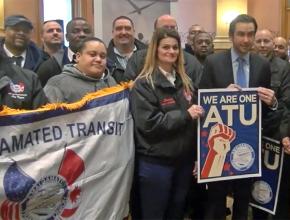A national coalition demands transit justice
reports on the organizing for a day of action around public transit issues.
JUST OVER 62 years ago, Rosa Parks defied Jim Crow segregation that consigned Black passengers to sit in the back of the bus. Her act of resistance spurred the African American community to organize the 381-day-long Montgomery Bus Boycott, one of the most important events of the civil rights movement.
Half a century later, Park's civil disobedience has inspired a national coalition of labor, civil rights and environmental groups to organize Transit Equity Day.
According to the Labor Network for Sustainability, Transit Equity Day "is a collaborative effort of several organizations and unions to promote public transit as a civil right and a strategy to combat climate change." The coalition chose Parks' birthday of February 4 for the day of action, but observed it on February 5 this year since it was a weekday.
While the coalition is small and the day of action made few headlines, Transit Equity Day is a good first step toward a badly needed public transit movement in the U.S.
LOCAL ADVOCACY groups such as Pittsburghers for Public Transit and OPAL Environmental Justice Portland have been organizing around transit for years, but this year was the first time a national coalition formed to organize a day of action.

It was also the first time organizations representing labor, civil rights and climate change struggles--including the Amalgamated Transit Union (ATU), the Sierra Club and the NAACP, among others-- worked together on this issue, sponsoring or endorsing the event.
The Labor Network for Sustainability put forward four demands:
-- Transportation Justice: Every person in every neighborhood...should have the right to safe, convenient transportation at an affordable cost.
Workers Justice: Transportation workers have the right to safe, decent working conditions, family-supporting incomes, and union representation.
Community Justice: Communities have the right to a just transit system that provides fair access to jobs and amenities.
Climate Justice: Communities are being affected by climate change and have the right to have transit vehicles that use clean, renewable energy.
There were actions of various sizes in 15 cities, each one planned by local organizations that are part of the national coalition. Two virtual town halls allowed organizers to come together via webcam and discuss their local issues and the actions they were planning.
In Nashville, the ATU and Music City Riders United organized around transit safety and workforce training for operators. In Denver, Mile High Connects, United for a New Economy, 9to5 Colorado the Colorado Cross-Disability Coalition, and the Montbello Organizing Committee called for a "vendor credit reduction" to fund an income-based transit pass.
THE NEED for a grassroots public transit movement is urgent. Like other public services, transit has been a victim of neoliberalism. Many agencies have been woefully underfunded for decades, leading to poor service delivery, service cuts, maintenance backlogs and fare increases.
The austerity drive has also left agencies using ancient, polluting technologies that contribute to climate change. Public agencies like Amtrak are going without new safety technology, such as positive train control, which could be preventing deadly accidents--in the past two months, there have been three fatal crashes in Washington State, Virginia and South Carolina that all could have been avoided.
Due to lack of regulations, public transit is also facing increasing competition from transportation network companies (TNCs) that are starting to mimic transit service, such as Lyft Line.
Politicians refuse to fund public transit at a level where it can compete with these companies, so the public system is losing ridership to them. Capitalist would love for nonunion TNCs to replace public transit.
At the same time, there are also many areas that are still not served by public transit, despite experience population growth--what are called transit deserts. When local governments finally do build transit, they opt for modes that serve developers more than passengers, like streetcars.
The people who pay the price for all of this are disproportionately low-income workers, including many people of color. Meanwhile, transit operators work in increasingly unsafe conditions--something dramatized by a near-walkout by ATU members over safety issues in the Washington Metropolitan Area Transit Authority.
While all the problems of public transportation have been present for some time, they are likely to get worse during the Trump administration--particularly as a consequence of the White House proposal on infrastructure. As Neil Loehein wrote at SocialistWorker.org, "Everything about Trump's [infrastructure] proposal is structured to create maximum gain and minimal risk for private investors and corporate construction giants, while doing precious little to make sure what gets built is what's actually needed."
Since transit isn't profitable--hence why it was taken over in the public domainby the mid-20th century--it's likely the White House won't prioritize transit projects.
Some commentators are speculating that the Trump administration will enforce new funding requirements for transit projects, such as special tax districts that deprive local tax revenue from cities. There is also talk of taking funding from the federal transit budget to fund highway projects.
Given the urgency of the need, it was refreshing to see a new coalition form to defend public transit and make connections among organizations dedicated to labor, civil rights and climate justice.


